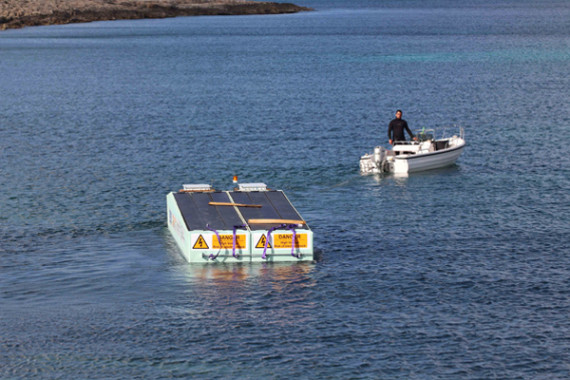Green Energy

- Biggest Floating Solar Power Plant Built In Hyogo
Article originally published on www.jw.asahi.com, in May 26th, 2015KASAI, Hyogo Prefecture--The world's largest floating solar power plant has been built on Sakasamaike Pond here.A ceremony was held May 24 to mark the completion of the mega...
- Brazilian State Minas Gerais To Invest $324 Million In Solar Pv Projects
Article originally published in www.cleantechnica.com, on May 11th 2015Minas Gerais, the south-eastern state of Brazil, has announced that it will start auctions of solar photovoltaic power plants later this year.The state government recently announced that...
- Kyocera Tcl Completes Work On Floating Mega-solar Plants
Article originally published in http://www.greentechlead.com/, on april 21st 2015Kyocera TCL Solar has completed construction of two floating mega-solar power plants in Kato city, Hyogo Prefecture, Japan.The joint venture company formed by Kyocera...
- Why The Buzz Around Floating Solar Pv?
We have said this before: floating solar is the new exotic solar these days. From Australia, to India, to Japan, to Korea, to the US, and now Brazil, everyone has been announcing floating solar pv power projects in all shapes and sizes. The reason these...
- From Land To Water
Article published on http://www.pv-magazine.com/archive/ on April 2012 Floating PV systems: Photovoltaic systems have been successfully deployed on land and in space for many years, so it was only a matter of time before water-based...
Green Energy
Floating Solar Takes To The Open Sea
Article originally published in cleantechnica.com, on April 20th 2015
Like many other island countries, Malta is dependent on oil to meet much of its electricity needs. As an EU member, however, the country is required to produce at least 10% of its energy from renewables by 2020.
Sometime back, Malta was considering floating wind farms to increase renewables in its electricity mix. Given its location, solar power is also a good option. However, scarcity of land virtually rules out any plans to build large scale ground mounted solar plants.
Now you might argue why not build rooftop solar, but then to quote the Joker — Where’s the fun in that? Why not build the solar plants out in the seas?

Considering the attractive proposition of putting floating solar farms at sea, the Malta Council for Science and Technology has funded a 3 year project to look into the matter.
The EUR 200,000 project is led by Professor Luciano Mule’Stagno of the Institute for Sustainable Energy at the University of Malta, with Pandia Energy and General Membrane Ltd. as the industrial partners.
The project has been named ‘SolAqua’, and will test the technical and financial feasibility of floating solar panels in the open sea.
We have talked at length of the benefits of floating solar plants in several posts, and how several countries including Australia, Brazil, India, Japan, Korea, and the US have been setting up such plants in various sizes.
The reflection of the water surface and the cooling effect of the sea can increase the electricity yield from the solar panels in floating solar systems. But what makes SolAqua important is its ambition to take to the seas. A lot of the initial floating solar plants came up on still water bodies, perhaps the bravest commercial attempt (yet to be executed) has been announced by Brazil and India, who would be looking to install floating solar in dam reservoirs.
But installing and operating floating solar in the open sea would be an entirely different beast to deal with. Factors that are being studied at the moment include sea-worthiness, the effect of salt drying on the panels on their output, cooling and reflection effects, and corrosion.
SolAqua is a three-phase project. Phase 1 which was launched in December 2014, involves testing a prototype consisting of rafts with flexible panels on top of them. From here the project will move on to test proprietary designs proposed by the University of Malta. Promising results will pave the path for commercialization of the idea.
Photo Credit: University of Malta via university website
- Biggest Floating Solar Power Plant Built In Hyogo
Article originally published on www.jw.asahi.com, in May 26th, 2015KASAI, Hyogo Prefecture--The world's largest floating solar power plant has been built on Sakasamaike Pond here.A ceremony was held May 24 to mark the completion of the mega...
- Brazilian State Minas Gerais To Invest $324 Million In Solar Pv Projects
Article originally published in www.cleantechnica.com, on May 11th 2015Minas Gerais, the south-eastern state of Brazil, has announced that it will start auctions of solar photovoltaic power plants later this year.The state government recently announced that...
- Kyocera Tcl Completes Work On Floating Mega-solar Plants
Article originally published in http://www.greentechlead.com/, on april 21st 2015Kyocera TCL Solar has completed construction of two floating mega-solar power plants in Kato city, Hyogo Prefecture, Japan.The joint venture company formed by Kyocera...
- Why The Buzz Around Floating Solar Pv?
We have said this before: floating solar is the new exotic solar these days. From Australia, to India, to Japan, to Korea, to the US, and now Brazil, everyone has been announcing floating solar pv power projects in all shapes and sizes. The reason these...
- From Land To Water
Article published on http://www.pv-magazine.com/archive/ on April 2012 Floating PV systems: Photovoltaic systems have been successfully deployed on land and in space for many years, so it was only a matter of time before water-based...
